共享经济的好处和坏处 英文PPT模板
- 格式:pptx
- 大小:7.98 MB
- 文档页数:6
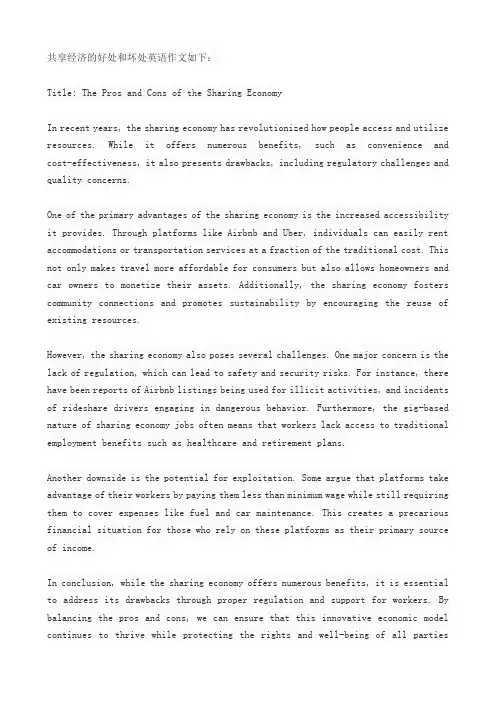
共享经济的好处和坏处英语作文如下:Title: The Pros and Cons of the Sharing EconomyIn recent years, the sharing economy has revolutionized how people access and utilize resources. While it offers numerous benefits, such as convenience and cost-effectiveness, it also presents drawbacks, including regulatory challenges and quality concerns.One of the primary advantages of the sharing economy is the increased accessibility it provides. Through platforms like Airbnb and Uber, individuals can easily rent accommodations or transportation services at a fraction of the traditional cost. This not only makes travel more affordable for consumers but also allows homeowners and car owners to monetize their assets. Additionally, the sharing economy fosters community connections and promotes sustainability by encouraging the reuse of existing resources.However, the sharing economy also poses several challenges. One major concern is the lack of regulation, which can lead to safety and security risks. For instance, there have been reports of Airbnb listings being used for illicit activities, and incidents of rideshare drivers engaging in dangerous behavior. Furthermore, the gig-based nature of sharing economy jobs often means that workers lack access to traditional employment benefits such as healthcare and retirement plans.Another downside is the potential for exploitation. Some argue that platforms take advantage of their workers by paying them less than minimum wage while still requiring them to cover expenses like fuel and car maintenance. This creates a precarious financial situation for those who rely on these platforms as their primary source of income.In conclusion, while the sharing economy offers numerous benefits, it is essential to address its drawbacks through proper regulation and support for workers. By balancing the pros and cons, we can ensure that this innovative economic model continues to thrive while protecting the rights and well-being of all partiesinvolved.。
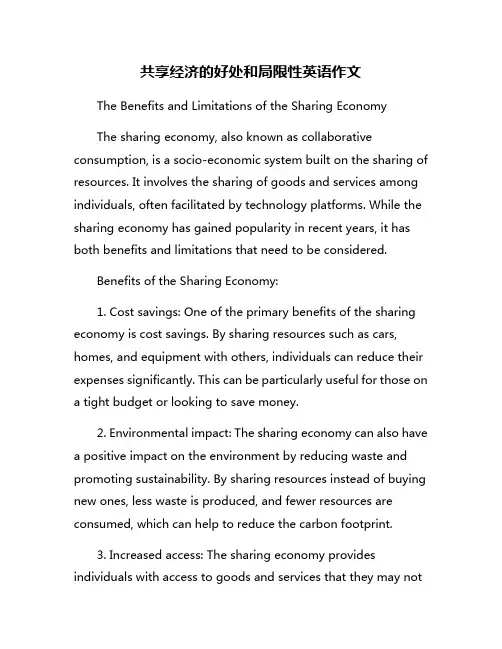
共享经济的好处和局限性英语作文The Benefits and Limitations of the Sharing EconomyThe sharing economy, also known as collaborative consumption, is a socio-economic system built on the sharing of resources. It involves the sharing of goods and services among individuals, often facilitated by technology platforms. While the sharing economy has gained popularity in recent years, it has both benefits and limitations that need to be considered.Benefits of the Sharing Economy:1. Cost savings: One of the primary benefits of the sharing economy is cost savings. By sharing resources such as cars, homes, and equipment with others, individuals can reduce their expenses significantly. This can be particularly useful for those on a tight budget or looking to save money.2. Environmental impact: The sharing economy can also havea positive impact on the environment by reducing waste and promoting sustainability. By sharing resources instead of buying new ones, less waste is produced, and fewer resources are consumed, which can help to reduce the carbon footprint.3. Increased access: The sharing economy provides individuals with access to goods and services that they may nothave been able to afford otherwise. This can be especially beneficial for those in underserved communities or with limited financial means, as it can provide them with access to essential resources.4. Social connections: The sharing economy can help to build social connections and foster a sense of community. By sharing resources with others, individuals can form relationships and partnerships that can lead to mutual benefit and support.Limitations of the Sharing Economy:1. Quality control: One of the limitations of the sharing economy is the lack of quality control. Since shared goods and services are often owned and maintained by individuals, there is a risk of receiving low-quality or subpar items. This can impact the overall experience and satisfaction of users.2. Regulation: The sharing economy operates in a largely unregulated space, which can lead to issues related to safety, liability, and accountability. Without proper regulations in place, there is a risk of exploitation, fraud, and legal disputes.3. Privacy concerns: The sharing economy relies heavily on the use of technology platforms to facilitate transactions, which can raise privacy concerns. Personal information and data areoften shared with third-party providers, raising questions about data security and protection.4. Inequality: The sharing economy has been criticized for exacerbating existing social and economic inequalities. While it can provide access to resources for some, it may also exclude others who do not have the means or ability to participate in the sharing economy.In conclusion, the sharing economy has the potential to bring about positive change by promoting collaboration, sustainability, and financial savings. However, it also presents challenges related to quality control, regulation, privacy, and inequality that need to be addressed. By recognizing and addressing these limitations, the sharing economy can continue to evolve and thrive as a viable alternative to traditional consumption models.。
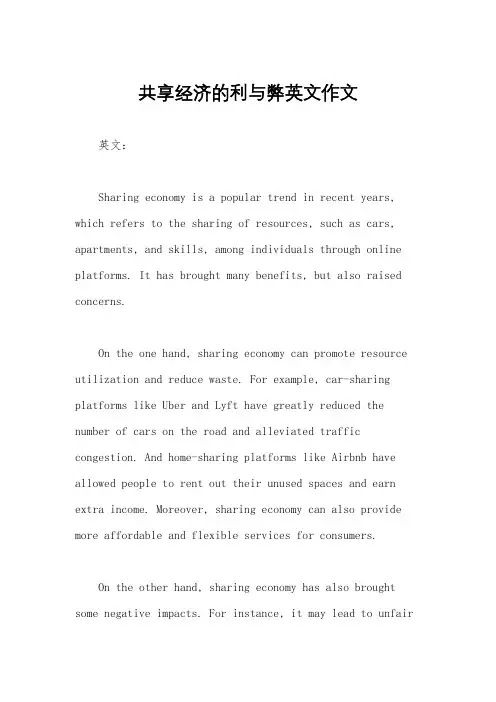
共享经济的利与弊英文作文英文:Sharing economy is a popular trend in recent years, which refers to the sharing of resources, such as cars, apartments, and skills, among individuals through online platforms. It has brought many benefits, but also raised concerns.On the one hand, sharing economy can promote resource utilization and reduce waste. For example, car-sharing platforms like Uber and Lyft have greatly reduced the number of cars on the road and alleviated traffic congestion. And home-sharing platforms like Airbnb have allowed people to rent out their unused spaces and earn extra income. Moreover, sharing economy can also provide more affordable and flexible services for consumers.On the other hand, sharing economy has also brought some negative impacts. For instance, it may lead to unfaircompetition and tax evasion. Some sharing economy platforms do not comply with regulations and do not pay taxes, which may harm the interests of traditional businesses and the government. Additionally, sharing economy may also raise privacy and security concerns, as people need to sharetheir personal information and belongings with strangers.In my opinion, sharing economy is a double-edged sword. It can bring many benefits, but also pose challenges and risks. Therefore, we need to strike a balance between innovation and regulation, and ensure that sharing economy operates in a fair and responsible manner.中文:共享经济是近年来的一个流行趋势,它指的是通过在线平台在个人之间共享资源,如汽车、公寓和技能。
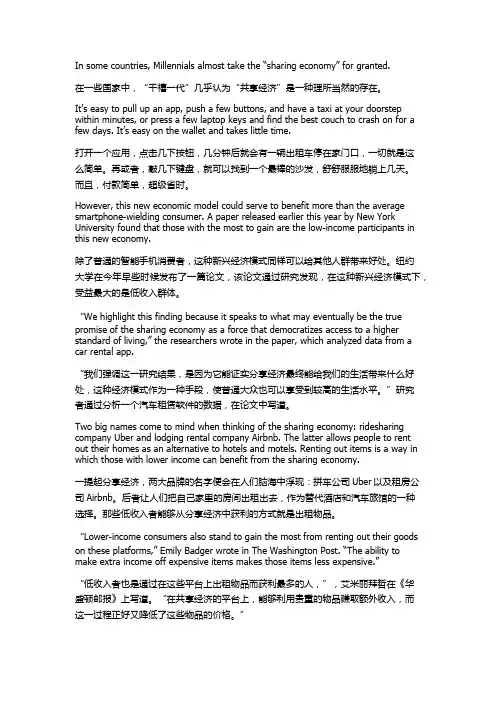
In some countries, Millennials almost take the “sharing economy” for granted.在一些国家中,“千禧一代”几乎认为“共享经济”是一种理所当然的存在。
It’s easy to pull up an app, push a few buttons, and have a taxi at your doorstep within minutes, or press a few laptop keys and find the best couch to crash on for a few days. It’s easy on the wallet and takes little time.打开一个应用,点击几下按钮,几分钟后就会有一辆出租车停在家门口,一切就是这么简单。
再或者,敲几下键盘,就可以找到一个最棒的沙发,舒舒服服地躺上几天。
而且,付款简单,超级省时。
However, this new economic model could serve to benefit more than the average smartphone-wielding consumer. A paper released earlier this year by New York University found that those with the most to gain are the low-income participants in this new economy.除了普通的智能手机消费者,这种新兴经济模式同样可以给其他人群带来好处。
纽约大学在今年早些时候发布了一篇论文,该论文通过研究发现,在这种新兴经济模式下,受益最大的是低收入群体。
“We highlight this finding because it speaks to what may eventually be the true promise of the sharing economy as a force that democratizes access to a higher standard of living,” th e researchers wrote in the paper, which analyzed data from a car rental app.“我们强调这一研究结果,是因为它能证实分享经济最终能给我们的生活带来什么好处,这种经济模式作为一种手段,使普通大众也可以享受到较高的生活水平。
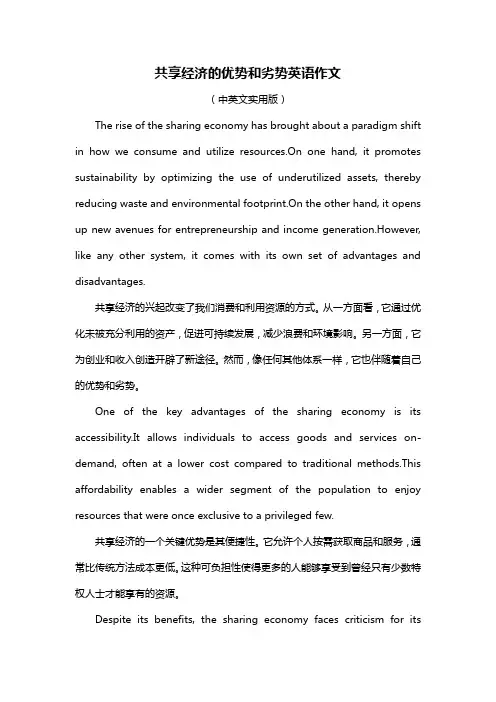
共享经济的优势和劣势英语作文(中英文实用版)The rise of the sharing economy has brought about a paradigm shift in how we consume and utilize resources.On one hand, it promotes sustainability by optimizing the use of underutilized assets, thereby reducing waste and environmental footprint.On the other hand, it opens up new avenues for entrepreneurship and income generation.However, like any other system, it comes with its own set of advantages and disadvantages.共享经济的兴起改变了我们消费和利用资源的方式。
从一方面看,它通过优化未被充分利用的资产,促进可持续发展,减少浪费和环境影响。
另一方面,它为创业和收入创造开辟了新途径。
然而,像任何其他体系一样,它也伴随着自己的优势和劣势。
One of the key advantages of the sharing economy is its accessibility.It allows individuals to access goods and services on-demand, often at a lower cost compared to traditional methods.This affordability enables a wider segment of the population to enjoy resources that were once exclusive to a privileged few.共享经济的一个关键优势是其便捷性。


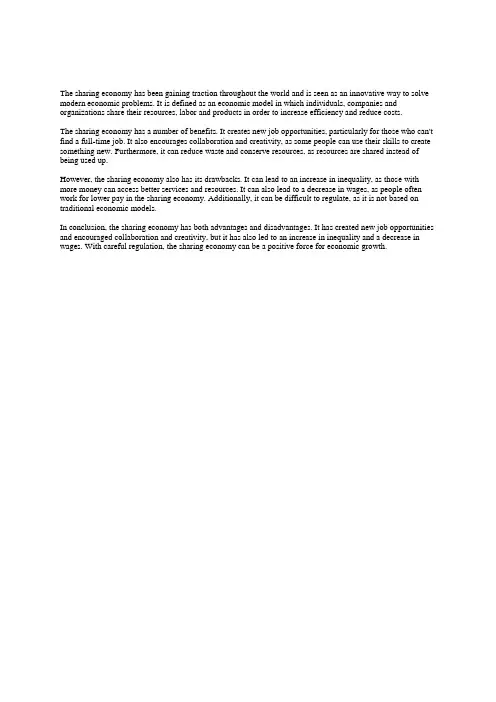
The sharing economy has been gaining traction throughout the world and is seen as an innovative way to solve modern economic problems. It is defined as an economic model in which individuals, companies and organizations share their resources, labor and products in order to increase efficiency and reduce costs.The sharing economy has a number of benefits. It creates new job opportunities, particularly for those who can't find a full-time job. It also encourages collaboration and creativity, as some people can use their skills to create something new. Furthermore, it can reduce waste and conserve resources, as resources are shared instead of being used up.However, the sharing economy also has its drawbacks. It can lead to an increase in inequality, as those with more money can access better services and resources. It can also lead to a decrease in wages, as people often work for lower pay in the sharing economy. Additionally, it can be difficult to regulate, as it is not based on traditional economic models.In conclusion, the sharing economy has both advantages and disadvantages. It has created new job opportunities and encouraged collaboration and creativity, but it has also led to an increase in inequality and a decrease in wages. With careful regulation, the sharing economy can be a positive force for economic growth.。
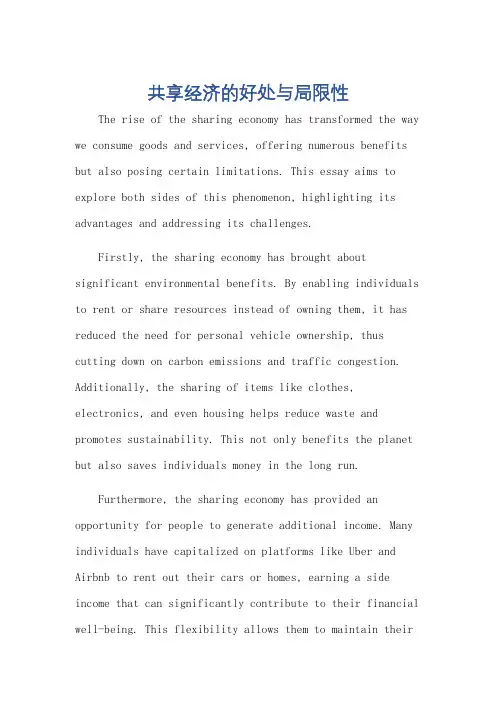
共享经济的好处与局限性The rise of the sharing economy has transformed the way we consume goods and services, offering numerous benefits but also posing certain limitations. This essay aims to explore both sides of this phenomenon, highlighting its advantages and addressing its challenges.Firstly, the sharing economy has brought about significant environmental benefits. By enabling individuals to rent or share resources instead of owning them, it has reduced the need for personal vehicle ownership, thus cutting down on carbon emissions and traffic congestion. Additionally, the sharing of items like clothes, electronics, and even housing helps reduce waste and promotes sustainability. This not only benefits the planet but also saves individuals money in the long run.Furthermore, the sharing economy has provided an opportunity for people to generate additional income. Many individuals have capitalized on platforms like Uber and Airbnb to rent out their cars or homes, earning a side income that can significantly contribute to their financial well-being. This flexibility allows them to maintain theirregular jobs or pursue other passions while still generating additional revenue.Moreover, the sharing economy has fostered a sense of community and connectivity. Through platforms that connect people with shared interests or needs, it has enabled individuals to meet new people, form relationships, and engage in collaborative projects. This aspect of the sharing economy not only enhances social interaction but also contributes to a more inclusive and interconnected society.However, despite these benefits, the sharing economy also has its limitations. One significant challenge is the issue of regulation. As the sharing economy continues to grow and evolve, it has become increasingly difficult for governments and regulatory bodies to keep up with the pace of change. This has led to a regulatory vacuum in some areas, allowing unethical or illegal practices to thrive. Additionally, the sharing economy can sometimes lead to displacement and income inequality. While some individuals may benefit from the ability to generate additional income through sharing platforms, others may find theirlivelihoods threatened by the competition from these platforms. For instance, traditional taxi drivers or hotel owners may face increased competition from Uber and Airbnb, potentially leading to job losses or reduced earnings.Furthermore, the sharing economy can also pose privacy and security concerns. As individuals share their personal information and belongings through these platforms, they may be exposed to risks of data breaches or theft. The lack of standardization and regulation in the sharing economy can make it difficult to ensure the safety and privacy of users.In conclusion, the sharing economy offers numerous benefits, including environmental sustainability, financial opportunities, and community building. However, it also poses challenges in terms of regulation, displacement, and privacy concerns. As the sharing economy continues to evolve, it is crucial for governments, businesses, and individuals to work together to address these challenges and ensure that the benefits of the sharing economy are shared by all.**共享经济的好处与局限性**共享经济的崛起已经改变了我们消费商品和服务的方式,带来了诸多好处,但同时也存在一些局限性。
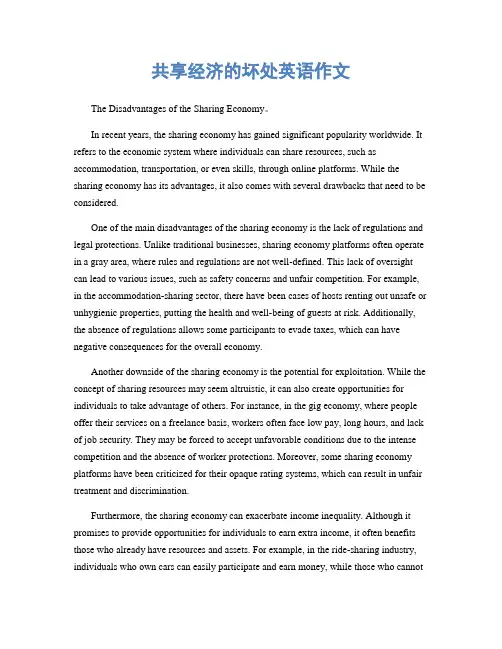
共享经济的坏处英语作文The Disadvantages of the Sharing Economy。
In recent years, the sharing economy has gained significant popularity worldwide. It refers to the economic system where individuals can share resources, such as accommodation, transportation, or even skills, through online platforms. While the sharing economy has its advantages, it also comes with several drawbacks that need to be considered.One of the main disadvantages of the sharing economy is the lack of regulations and legal protections. Unlike traditional businesses, sharing economy platforms often operate in a gray area, where rules and regulations are not well-defined. This lack of oversight can lead to various issues, such as safety concerns and unfair competition. For example, in the accommodation-sharing sector, there have been cases of hosts renting out unsafe or unhygienic properties, putting the health and well-being of guests at risk. Additionally, the absence of regulations allows some participants to evade taxes, which can have negative consequences for the overall economy.Another downside of the sharing economy is the potential for exploitation. While the concept of sharing resources may seem altruistic, it can also create opportunities for individuals to take advantage of others. For instance, in the gig economy, where people offer their services on a freelance basis, workers often face low pay, long hours, and lack of job security. They may be forced to accept unfavorable conditions due to the intense competition and the absence of worker protections. Moreover, some sharing economy platforms have been criticized for their opaque rating systems, which can result in unfair treatment and discrimination.Furthermore, the sharing economy can exacerbate income inequality. Although it promises to provide opportunities for individuals to earn extra income, it often benefits those who already have resources and assets. For example, in the ride-sharing industry, individuals who own cars can easily participate and earn money, while those who cannotafford a vehicle are excluded. This further widens the wealth gap and limits the potential benefits of the sharing economy to a select few.Additionally, the sharing economy can negatively impact traditional industries and local communities. As sharing platforms gain popularity, they often disrupt established businesses and lead to job losses. For example, the rise of home-sharing platforms has affected the hotel industry, with many hotels experiencing a decline in bookings. This can have a ripple effect on the local economy, as businesses dependent on the tourism industry suffer. Moreover, the rapid growth of sharing economy platforms can result in overcrowding and strain on local resources, such as transportation infrastructure and public spaces.In conclusion, while the sharing economy has its merits, it is crucial to recognize its drawbacks. The lack of regulations, potential for exploitation, exacerbation of income inequality, and negative impact on traditional industries and local communities are significant concerns. As the sharing economy continues to evolve, it is essential to address these issues and find ways to strike a balance between innovation and ensuring a fair and sustainable economic system for all.。
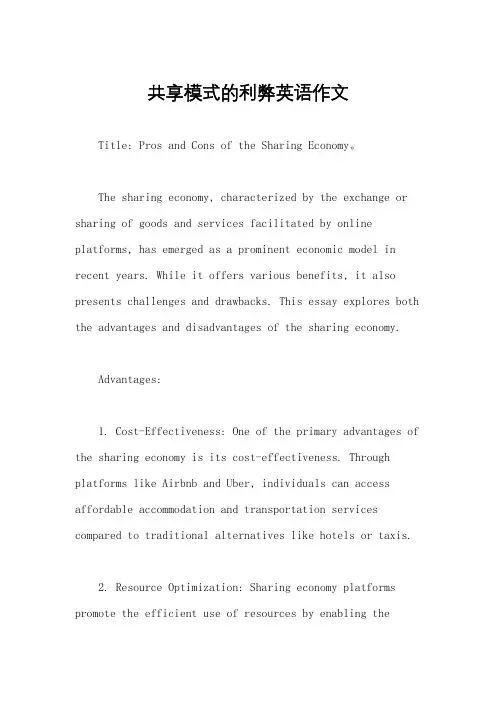
共享模式的利弊英语作文Title: Pros and Cons of the Sharing Economy。
The sharing economy, characterized by the exchange or sharing of goods and services facilitated by online platforms, has emerged as a prominent economic model in recent years. While it offers various benefits, it also presents challenges and drawbacks. This essay explores both the advantages and disadvantages of the sharing economy.Advantages:1. Cost-Effectiveness: One of the primary advantages of the sharing economy is its cost-effectiveness. Through platforms like Airbnb and Uber, individuals can access affordable accommodation and transportation services compared to traditional alternatives like hotels or taxis.2. Resource Optimization: Sharing economy platforms promote the efficient use of resources by enabling theutilization of underutilized assets. For instance, peer-to-peer car-sharing services allow car owners to rent outtheir vehicles when they're not in use, reducing idle capacity and maximizing the value of the asset.3. Income Generation: Participation in the sharing economy provides opportunities for individuals to earnextra income. People can monetize their assets, skills, or time by renting out spare rooms, providing freelance services, or offering rides through ridesharing platforms.4. Flexibility: The flexibility offered by the sharing economy is appealing to both service providers and consumers. Providers can choose their own schedules andwork on a freelance basis, while consumers can access services on-demand and often with customizable options.5. Community Building: Sharing economy platforms facilitate interactions and connections between individuals, fostering a sense of community and trust. Collaborative consumption encourages cooperation and mutual benefit, promoting a more interconnected society.Disadvantages:1. Regulatory Challenges: The sharing economy operates within a regulatory gray area, leading to conflicts with existing laws and regulations. Issues such as taxation, safety standards, and labor rights pose challenges both for platform operators and participants.2. Uneven Impact: While the sharing economy offers opportunities for income generation, it can exacerbate existing inequalities. Access to resources andopportunities within the sharing economy may be limited by factors such as socioeconomic status, education, and technological literacy, widening the gap between the haves and the have-nots.3. Quality and Safety Concerns: The lack of standardized quality control and safety regulations in the sharing economy can compromise consumer trust and safety. Instances of fraud, scams, and substandard services have been reported, raising concerns about accountability andliability.4. Market Disruption: The rise of sharing economy platforms has disrupted traditional industries and business models, leading to economic dislocation and job displacement in some sectors. Taxi drivers, hoteliers, and other established businesses have faced stiff competition from sharing economy services, prompting calls for regulatory intervention to level the playing field.5. Environmental Impact: While the sharing economy has the potential to promote sustainability through resource optimization, it also has environmental consequences. Increased transportation activity associated with ridesharing and delivery services can contribute to congestion, air pollution, and carbon emissions, offsetting some of the environmental benefits.In conclusion, the sharing economy presents a complex array of opportunities and challenges. While it offerscost-effective solutions, income generation opportunities, and community-building potential, it also faces regulatoryhurdles, uneven impacts, and concerns regarding quality, safety, and environmental sustainability. Achieving a balance between innovation and regulation is crucial to harnessing the full potential of the sharing economy while mitigating its negative consequences.。
共享经济的优势和劣势英语作文The Pros and Cons of the Shared EconomyIn recent years, the shared economy has emerged as a new and disruptive business model, revolutionizing the way we consume and interact with resources. It has transformed various industries, from transportation to housing, and has brought about significant advantages as well as some notable disadvantages.One of the most significant advantages of the shared economy is its efficiency and convenience. By allowing individuals to share resources such as cars, bicycles, and even workspaces,the shared economy has significantly reduced waste and has provided convenient access to these resources when needed.This has not only reduced the environmental impact of individual ownership but has also made it easier for individuals to access the resources they need without the burden of ownership.Moreover,the shared economy has created new economic opportunities.By providing platforms for individuals to rent out their unused resources, the shared economy has given rise to a new class of entrepreneurs and has provided additional income streams for many. This has been particularly beneficial for those who may not have had access to traditional employment opportunities or who may have been unable to work due to various constraints.However,despite its many advantages,the shared economy also has some significant disadvantages. One of the main concerns is the lack of regulation and the potential for abuse.Since the shared economy often operates outside of traditional regulatory frameworks, there is a risk of unfair practices and exploitation, particularly for those who may not be as informed or as savvy as others.Additionally, the shared economy can have negative impacts on traditional industries. By disintermediating traditional service providers, the shared economy can disrupt established businesses and lead to job losses. This can be particularly difficult for those who rely on these traditional industries for their livelihoods.In conclusion,the shared economy has brought about many positive changes and has provided convenient and efficient access to resources. However, it also has its downsides, including potential for abuse and negative impacts on traditional industries. As the shared economy continues to evolve, it is important to strike a balance between its benefits and its drawbacks to ensure that it serves the needs of society in a sustainable and equitable manner.。
共享经济的利弊英语作文The Pros and Cons of the Sharing EconomyThe sharing economy has become a prevalent phenomenon in recent years, transforming the way we access goods and services. This innovative model, where individuals can share or rent assets, skills, and resources, has disrupted traditional industries and presented both opportunities and challenges. In this essay, we will explore the benefits and drawbacks of the sharing economy.One of the primary advantages of the sharing economy is its potential for increased efficiency and cost-savings. By utilizing underutilized assets, such as spare rooms, cars, or household items, individuals can generate additional income or access services at a lower cost. This democratization of access allows more people to enjoy the benefits of these resources without the burden of ownership. For example, services like Airbnb and Uber have enabled travelers to find affordable accommodations and transportation, often at a fraction of the cost of traditional hotel and taxi services.Moreover, the sharing economy promotes a more sustainable and environmentally-friendly approach to consumption. By encouragingthe sharing and reuse of goods, it reduces waste and the demand for new products, ultimately lowering the carbon footprint. This aligns with the growing societal emphasis on sustainability and the desire to minimize the environmental impact of our actions. Additionally, the sharing economy can foster a sense of community and social interaction, as individuals engage with one another in the exchange of goods and services.However, the sharing economy is not without its drawbacks. One significant concern is the potential for the exploitation of workers, particularly in the gig economy, where individuals provide services as independent contractors. These workers may lack the traditional benefits and protections afforded to employees, such as minimum wage, health insurance, and job security. This can lead to precarious working conditions and financial instability for those relying on the sharing economy as their primary source of income.Another challenge is the regulation and oversight of the sharing economy. As these new business models disrupt traditional industries, there are often gaps in the legal and regulatory frameworks that govern them. This can create a level of uncertainty and potential for abuse, as companies may operate in a regulatory gray area. For example, the lack of consistent standards and regulations in the short-term rental market has led to concerns about the impact on local housing availability and affordability.Furthermore, the sharing economy has raised privacy and security concerns. The exchange of personal information and the use of digital platforms to facilitate transactions can expose users to potential data breaches and the misuse of sensitive information. This can erode trust in the system and deter individuals from participating in the sharing economy.Additionally, the growth of the sharing economy has led to concerns about its impact on traditional industries and employment. As these new models gain traction, they can disrupt and potentially displace established businesses and workers, leading to job losses and economic disruption. This can create tensions and resistance from those who feel threatened by the changes brought about by the sharing economy.In conclusion, the sharing economy presents a complex landscape of both opportunities and challenges. While it offers the potential for increased efficiency, cost-savings, and environmental sustainability, it also raises concerns about worker exploitation, regulatory oversight, privacy, and the impact on traditional industries. As the sharing economy continues to evolve, it will be essential to strike a balance between fostering innovation and ensuring the protection of workers, consumers, and the broader community. Policymakers, industry leaders, and individuals must work together to address these issuesand harness the benefits of the sharing economy while mitigating its potential drawbacks.。
共享经济利大于弊英语作文The Sharing Economy: Benefits Outweigh Drawbacks。
With the development of the sharing economy, people are able to share their resources and services with others, which has brought about a lot of benefits. Although there are also some drawbacks, the advantages of the sharing economy are more significant.Firstly, the sharing economy can help to save resources and reduce waste. For instance, car-sharing services can reduce the number of vehicles on the road, which can lower emissions and ease traffic congestion. Also, sharing platforms for goods such as clothes, books, and toys can reduce the amount of waste generated by individuals. This can promote environmental sustainability and help to protect our planet.Secondly, the sharing economy can provide economic benefits for both providers and users. People can earnextra income by sharing their resources or skills, and users can save money by accessing goods and services at a lower cost. This can help to reduce economic inequality and promote social welfare.Thirdly, the sharing economy can promote social interaction and community building. Sharing platforms can connect people who have similar interests or needs, which can lead to new friendships and collaborations. This can also help to build trust and empathy among individuals and promote social cohesion.However, there are also some drawbacks to the sharing economy. Firstly, there may be concerns about safety and security. For example, some people may be hesitant to use sharing services because they are unsure about the quality of the goods or services provided. Secondly, there may be issues with regulation and taxation. Sharing platforms may not be subject to the same regulations and taxes as traditional businesses, which can create unfair competition and reduce government revenue.Despite these drawbacks, the benefits of the sharing economy are more significant. As long as appropriate measures are taken to ensure safety and security, and to regulate and tax sharing platforms appropriately, the sharing economy can bring about many positive changes for individuals, communities, and the environment. It is important for us to embrace the sharing economy and to explore new ways of sharing our resources and services to create a more sustainable and equitable society.。
共享经济的好处和坏处英语作文English:The sharing economy has many advantages, including providing more affordable and accessible services for consumers, utilizing underutilized resources, and reducing waste and environmental impact. Sharing economy platforms often allow people to rent out or share their assets, such as cars, homes, and even skills, which can help individuals earn extra income and make efficient use of their belongings. Additionally, sharing economy models promote a sense of community and collaboration, as they often involve peer-to-peer interactions and relationships. However, the sharing economy also has its drawbacks. It can lead to increased competition and lower wages for traditional businesses and workers, as well as potential safety and regulation concerns as not all sharing economy providers may adhere to the same standards and regulations as traditional businesses. Furthermore, there are also potential issues regarding privacy and data security when using sharing economy platforms, as personal information may be shared with strangers.中文翻译: 共享经济有许多优点,包括为消费者提供更实惠、更易获得的服务,利用未充分利用的资源,减少浪费和环境影响。
英语作文共享经济利弊分析英文:Sharing economy, also known as collaborative consumption, has become increasingly popular in recent years. It refers to the economic model where individuals can borrow or rent assets owned by someone else, rather than purchasing them outright. This concept has both advantages and disadvantages.On the one hand, the sharing economy promotes sustainability by reducing waste and promoting theefficient use of resources. For example, instead of buying a power drill that will only be used occasionally, people can borrow one from a neighbor through platforms like Airbnb or Uber. This not only saves money, but also reduces the demand for new products, thus lowering the environmental impact.Additionally, the sharing economy providesopportunities for individuals to earn extra income byrenting out their assets. For instance, someone with aspare room in their house can list it on Airbnb and earn money from hosting guests. This can be especiallybeneficial for people in need of additional income or those looking to make use of underutilized assets.On the other hand, the sharing economy also has its drawbacks. One concern is the lack of regulation and oversight, which can lead to safety and quality issues. For instance, there have been cases of Airbnb guests encountering unsafe living conditions or unclean accommodations. Without proper regulations, it can bedifficult to ensure the quality and safety of shared assets.Furthermore, the sharing economy has raised concerns about its impact on traditional businesses and employment. For example, the rise of ride-sharing services like Uberhas led to tensions with traditional taxi companies andtheir drivers. The increased competition from the sharing economy can threaten the livelihoods of those who rely on traditional employment in certain industries.In conclusion, the sharing economy has both positiveand negative aspects. While it promotes sustainability and provides opportunities for extra income, it also raises concerns about regulation and its impact on traditional businesses. As the sharing economy continues to grow, itwill be important to address these issues in order toensure a fair and safe environment for all participants.中文:共享经济,又称合作消费,在近年来变得越来越受欢迎。
The Downsides of the Sharing Economy In recent years, the sharing economy has gained significant popularity as a new way of conducting business and engaging in transactions. While this model has brought about many benefits, such as increased convenience and cost savings, it also has its drawbacks that are worth examining.Lack of Regulation and OversightOne of the primary criticisms of the sharing economy is the lack of regulation and oversight. Many sharing economy platforms operate in a legal grey area, as they often fall outside of traditional regulatory frameworks. This can create potential risks for both consumers and service providers, as there may be limited recourse in the event of disputes or issues.Exploitation of WorkersAnother concern associated with the sharing economy is the potential for exploitation of workers. Independent contractors who participate in sharing economy platforms are often not entitled to the same benefits and protections as traditional employees. This can lead to issues such as low wages, long working hours, and a lack of job security.Quality and Safety ConcernsThe quality and safety of services provided through sharing economy platforms can also be a significant concern. Since many service providers in the sharing economy are individual contractors, there may be inconsistencies in the level of quality and professionalism offered. Additionally, there may be limited mechanisms in place to ensure the safety and security of both consumers and providers.Impact on Traditional IndustriesThe rise of the sharing economy has also had a significant impact on traditional industries. Established businesses in sectors such as transportation, hospitality, and retail have had to adapt to new competitors who operate on different business models. This can lead to job losses, reduced revenues, and disruptions in the market.Environmental ImplicationsDespite the potential for efficiency and resource sharing in the sharing economy, there are also environmental implications to consider. Factors such as increased demand for transportation services and excessive consumption can contribute to environmental degradation and resource depletion.ConclusionWhile the sharing economy has brought about many benefits and opportunities, it is important to acknowledge and address its downsides. By considering the lack of regulation, potential exploitation of workers, quality and safety concerns, impact on traditional industries, and environmental implications, we can work towards creating a more balanced and sustainable model for economic exchange.。